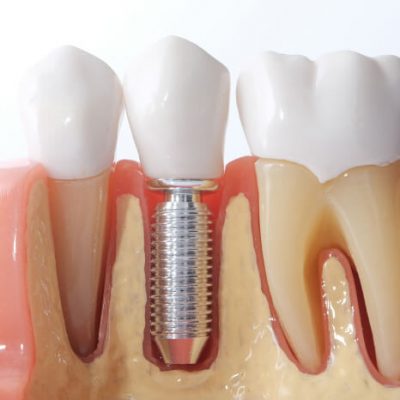Types of Dental Implants
Endosteal Dental Implants
The most common type of dental implant is endosteal. With endosteal dental implants,the post gets inserted directly into the bone and is used for those who have enough bone structure to support it.
There are various dental implant treatments available today. However, each dental office offers different options. To learn more about the options offered at our Auburn practice, contact Dr. Heffelfinger today.
Single-Tooth Dental Implants
Single-tooth dental implantscompletely replace one lost tooth from root to crown. It involves the placement of a titanium implant into the jawbone that serves as the foundation for a custom-made prosthetic single-tooth replacement itself. Most patients receive a dental crown as the visible portion of their implant treatment. Single-tooth replacement with a dental implant provides patients with a permanent solution for missing or damaged teeth.
All-On-Four
All-on-four dental implantsare full-arch replacement options. It involves placing four dental implants in the upper or lower jawbone and securing a full arch of prosthetic replacement teeth to them. The All-on-four technique is less invasive and can be completed in one day. All-on-four implants are a good option for those who have lower bone density, as they allow for the restoration of a full arch of teeth while using fewer implant posts.
Implant-Supported Bridges
Implant-supported bridges are excellent options for replacing multiple teeth. A traditional dental bridgeor artificial tooth root is anchored to the jaw using dental implants. The bridge is typically made up of two or more artificial teeth that are connected and attached to the implant abutments. The number of posts needed will vary depending on the size of the bridge.
Implant-Supported Dentures
Implant-supported denturesare removable appliances anchored to the mouth and jaw using dental implants. They provide a more secure fit and eliminate messy adhesives that removable dentures typically need. Implant-supported dentures are also a more stable option than traditional dentures and can improve overall oral health by providing stimulation to the jawbone.
Mini Dental Implants
Mini dental implantsare a smaller version of traditional implants. They’re a less invasive implant surgery option typically used to replace a single tooth or stabilize a loose denture. They shorten the healing process and have a lower cost. However, they may not be suitable for patients who don’t have adequate bone density.
Immediate-Load “Same Day” Dental Implants
Immediate-load dental implants, also known as same-day implants, are done in one appointment. With immediate-load implants, dentists place the implant and prosthetic tooth in the mouth at the same time, allowing the patient to leave the dental office with a fully functional replacement tooth after just one dental implant procedure.
Zygomatic Dental Implants
Zygomatic dental implantscan restore lost teeth for patients who don’t have enough jawbone density to support a traditional endosteal implant. While zygomatic implants are still in use, they’re less common today and aren’t used by our Auburn dentist.
Subperiosteal Dental Implants
Subperiosteal dental implantssit on top of the jawbone but under the gum tissue. Subperiosteal implants are rarely ever used because of modern technological advancements in the field of implant dentistry.


